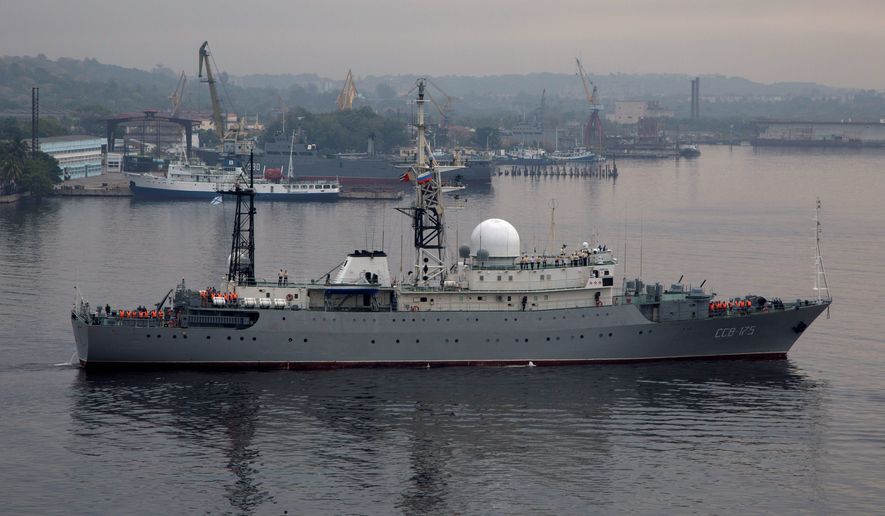An intelligence ship cruising just off the East Coast. A cruise missile test that may violate arms treaties. A string of Russian fighter jet fly-bys that buzz U.S. and allied ships. Provocations all along the fault lines separating Russia from the West, from the Baltics to the Balkans.
Russian harassment of U.S. military assets has surged in recent weeks, testing the new Trump administration and drawing a sharp response from Mr. Trump’s top aides — even as the White House comes under fire for working too closely with Vladimir Putin’s Kremlin.
Russia’s recent aggressions have put the U.S. in “an uncomfortable strategic equation,” Defense Secretary James Mattis said Wednesday, addressing NATO’s defense chiefs on his first trip to Brussels since his confirmation.
But with the White House engulfed in a scandal over Russian influence and possible ties to senior Trump aides, it’s not clear how the American military will respond.
The challenges could be front and center when Gen. Joseph Dunford, chairman of the Joint Chiefs of Staff, meets with his Russian counterpart, Gen. Valeriy Gerasimov, for talks in Azerbaijan Thursday. While U.S. officials have expressed concerns about Russian military moves in recent days, President Trump has also raised the prospect the two countries could coordinate more closely in the fight against Islamic State in Syria and elsewhere.
Drawing the most concern and media attention has been the progress of a Russian surveillance warship as it inched closer to a key Navy submarine base off the coast of Connecticut. The Vishnya-class intelligence vessel, dubbed the Viktor Leonov, was spotted in international waters 30 miles off the American coast near Delaware, and the timing and purpose of its mission have sparked a heated debate.
As a signals intelligence ship designed to intercept electronic communications, the Viktor Leonov’s proximity to Naval Submarine Base New London in Groton, Connecticut, has set off alarm bells in the Pentagon and among intelligence agencies.
“We are aware of the vessel’s presence,” Pentagon spokeswoman Lt. Col. Valerie Henderson told Fox News. Since the ship has not entered U.S. territorial waters, Navy officials have not engaged the vessel or tried to alter its course.
“We respect freedom of navigation exercised by all nations beyond the territorial sea of a coastal state, consistent with international law,” Lt. Col. Henderson added.
News of the Viktor Leonov’s operations came just days after Russian warplanes reportedly harassed American warships again operating in Eastern Europe. A Russian cargo aircraft and three Russian fighter jets made repeated high-speed, low-altitude passes over the Arleigh Burke-class destroyer USS Porter, which was conducting what U.S. officials said were routine maritime exercises in the Black Sea.
NATO-Russia tensions
Russian warplanes have repeatedly engaged American vessels in the region since U.S. forces ramped up their presence in Eastern Europe as part of the NATO-led “Atlantic Resolve” security operation. The NATO mission is designed as a deterrent to Russia’s aggressive moves in the region, beginning with the annexation of Crimea from Ukraine in 2014, and U.S. military officials say some of the close-in fly-bys have posed a danger both to the ships and the Russian planes.
Russian defense officials announced Moscow would never return the Crimean Peninsula to Ukraine, brushing aside claims that the March 2014 referendum vote endorsing the annexation was illegitimate. Kremlin officials insist that returning control of Crimea to Ukraine will be off the table in any future discussions between Moscow and Washington.
“We don’t give back our own territory. Crimea is territory belonging to the Russian Federation,” Maria Zakharova, spokeswoman for the Russian Foreign Ministry, told a news briefing on Wednesday.
Moscow’s new assertiveness on the world stage has forced the U.S. into a tenuous rebalancing act, though straddling the line between “collaboration and confrontation is admittedly an uncomfortable strategic equation,” Mr. Mattis said Wednesday.
“While the United States and the alliance seek to engage with Russia, we must at the same time defend ourselves if Russia chooses to act contrary to international law,” Mr. Mattis said in Brussels.
While President Trump in the past has questioned NATO’s mission as “obsolete,” Mr. Mattis has been far more outspoken about confronting the security challenge from Moscow and bolstering U.S. alliances in Europe and the Middle East.
Washington remains “open to opportunities to restore a cooperative relationship with Moscow,” but the U.S. and its allies remain unwilling “to surrender the values of this alliance nor let Russia, through its actions, speak louder than anyone in [NATO],” the retired Marine general said in his Senate confirmation hearing last month.
While Mr. Mattis touted the alliance’s key role in preserving peace and order in Europe, he also chastised members’ unwillingness to pay their fair share into the organization’s collective defense in his Brussels remarks.
U.S. and NATO officials are still deciding how to respond to reports that Russia may have violated a longstanding arms treaty by deploying a new cruise missile. U.S. intelligence agencies have assessed that the missile became operational late last year, possibly violating the 1987 Intermediate-Range Nuclear Forces Treaty on the development and testing of cruise missiles, The Associated Press reported.
NATO Secretary-General Jens Stoltenberg told reporters Wednesday that “compliance with arms control agreements is of great importance, and especially when it comes to treaties covering nuclear weapons,” and “any noncompliance of Russia with the INF Treaty would be a serious concern for the alliance.”
The cruise missile has increased the unease on Capitol Hill, where Russia skeptics in both parties have pressed the Trump administration to take a tougher line against the Kremlin’s recent provocations.
“Russia’s deployment of nuclear-tipped ground-launched cruise missiles in violation of the INF treaty is a significant military threat to U.S. forces in Europe and our NATO allies,” Senate Armed Services Committee Chairman John McCain, Arizona Republican, said in a statement Tuesday. He said Russian President Vladimir Putin was “testing” Mr. Trump.
• This article was based in part on wire service reports.
• Carlo Muñoz can be reached at cmunoz@washingtontimes.com.




Please read our comment policy before commenting.